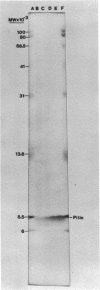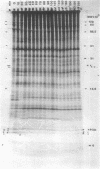Abstract
Pili are functionally expressed during the predivisional and swarmer stages of the Caulobacter crescentus differentiation cycle. They appear on the developing swarmer pole and at the same cellular location as flagella and the phiCbK receptor sites. Pili disappear when the swarmer cell differentiates into a stalked cell; this occurs with the loss of flagella and the disappearance of phage receptor sites. C. crescentus CB13B1a pili have been purified and characterized. Monomeric pilin is a protein with an apparent molecular weight of 8,500 that stains weakly with periodic acid-Schiff reagent. The amino acid composition of purified pilin reveals very low quantities of basic amino acids and a complete absence of methionine. Pilin is synthesized throughout the C. crescentus differentiation cycle. Neither free pili nor pilin monomers are detectable in the growth media, suggesting that loss of piliation in the swarmer- to stalked-cell transition occurs via pilus retraction.
Full text
PDF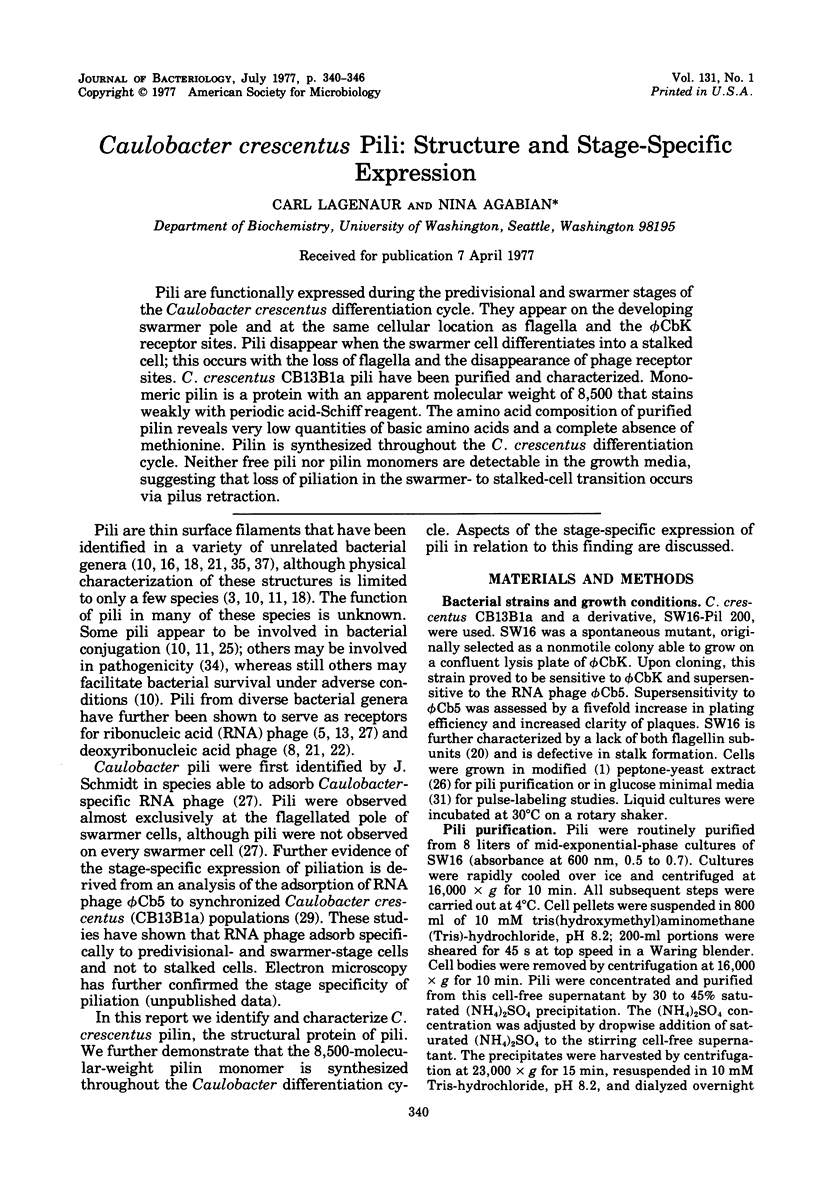
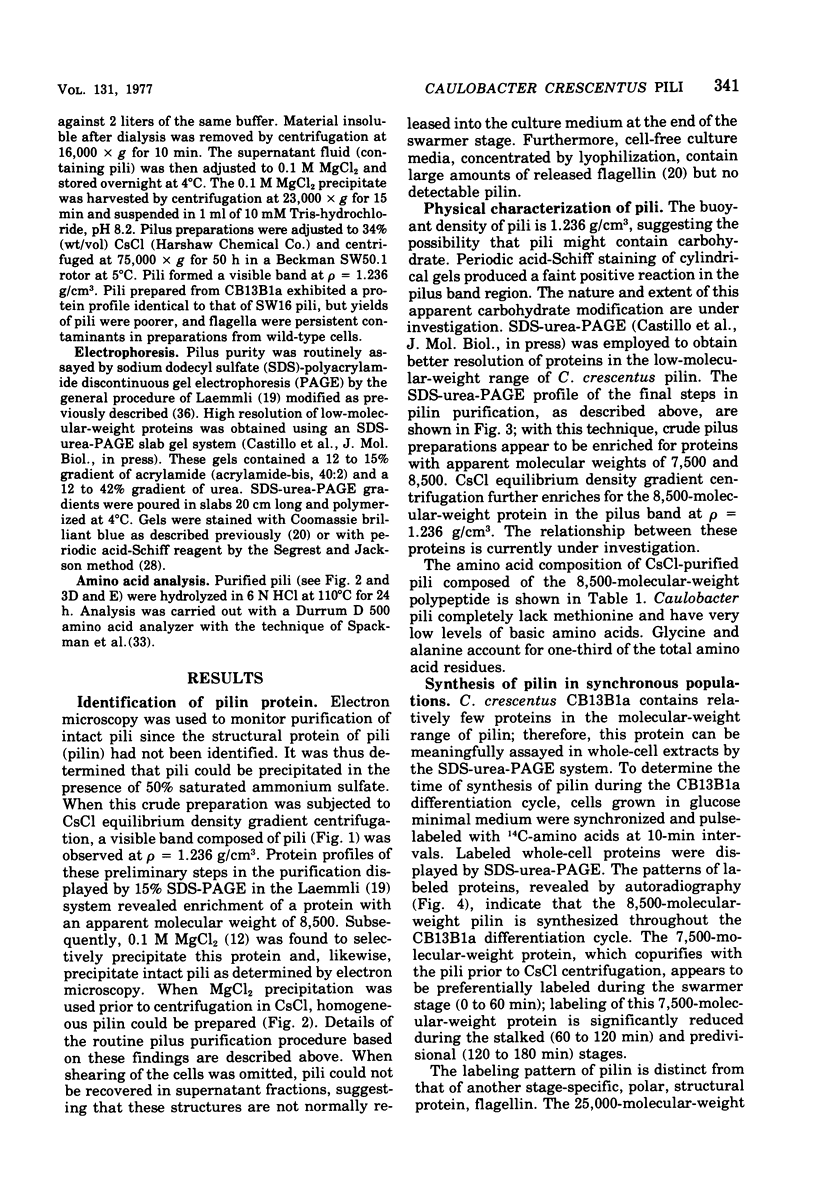
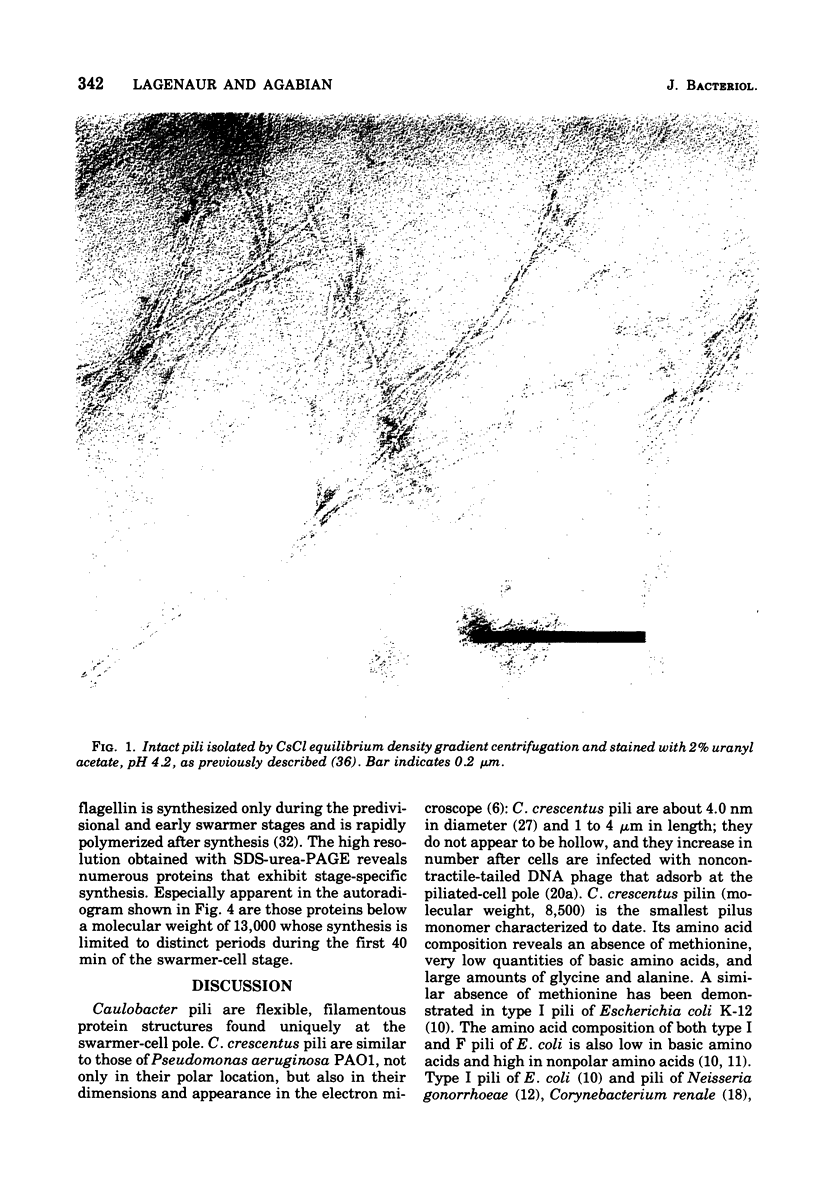
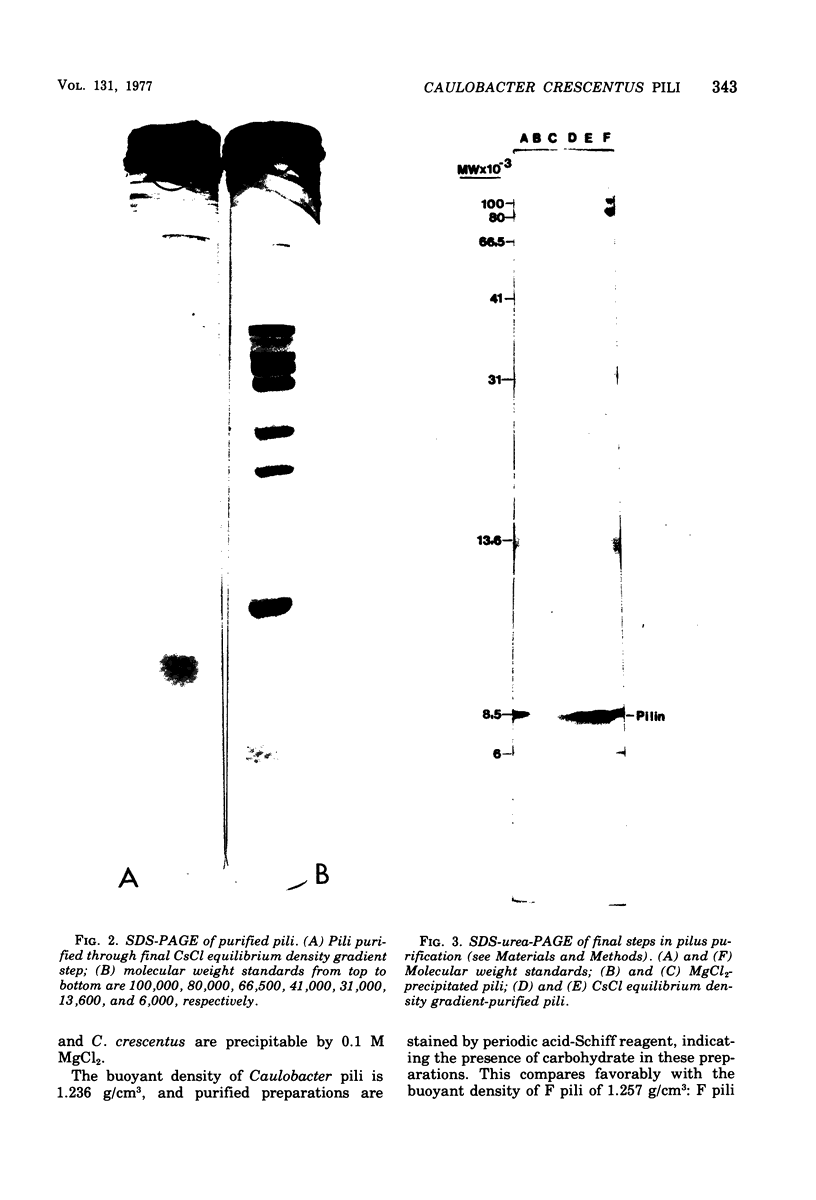
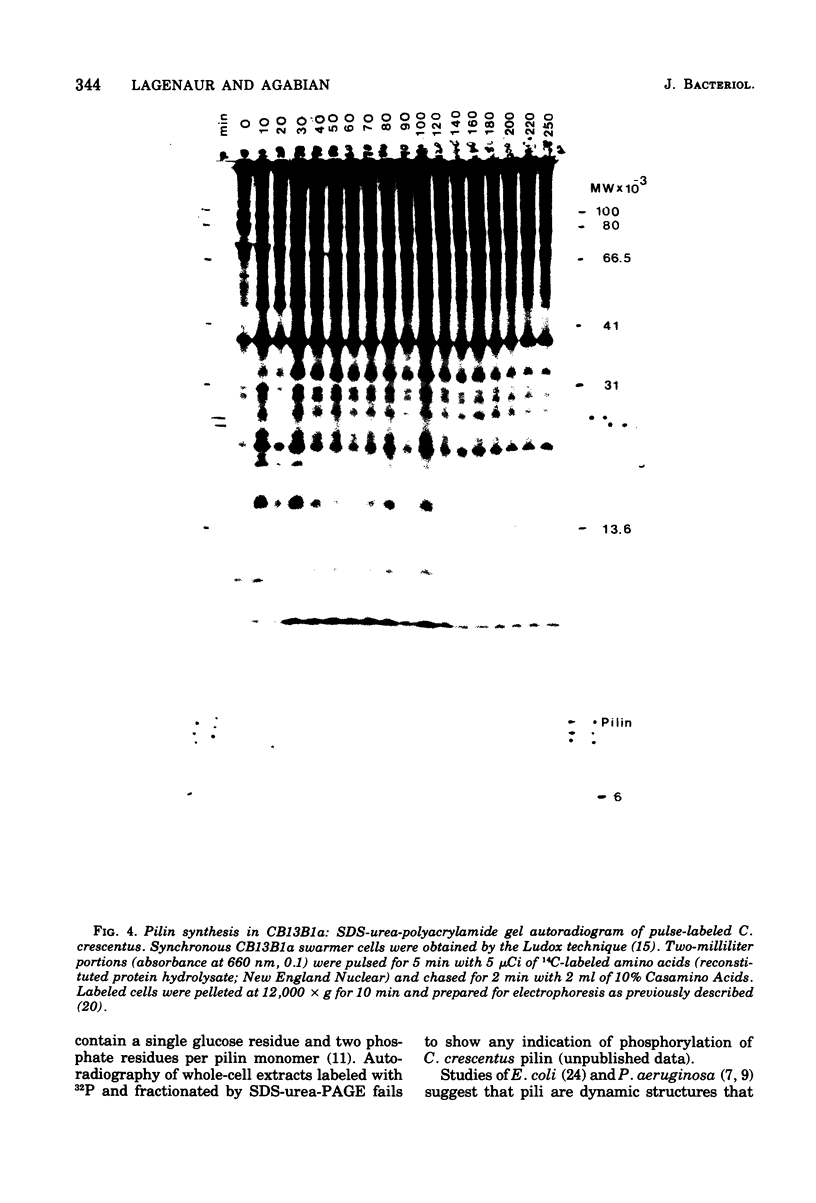
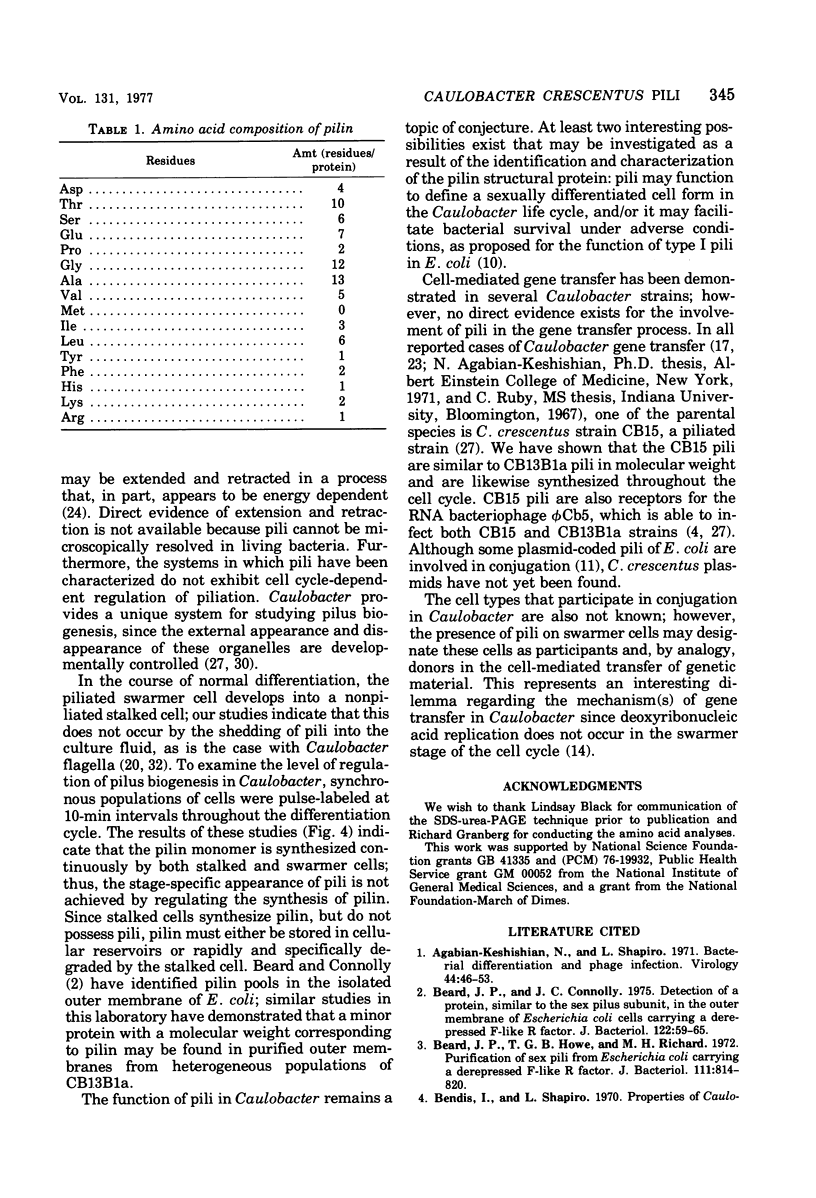
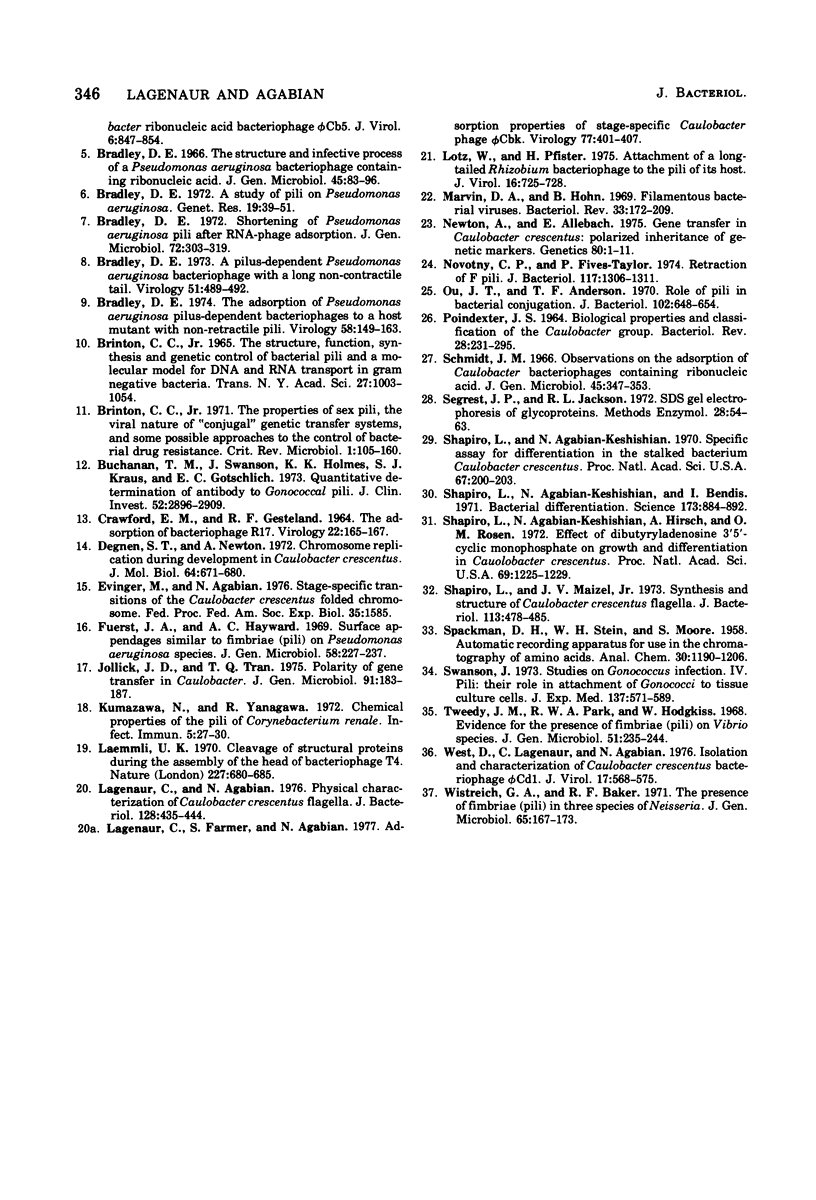
Images in this article
Selected References
These references are in PubMed. This may not be the complete list of references from this article.
- Agabian-Keshishian N., Shapiro L. Bacterial differentiation and phage infection. Virology. 1971 Apr;44(1):46–53. doi: 10.1016/0042-6822(71)90151-6. [DOI] [PubMed] [Google Scholar]
- Beard J. P., Connolly J. C. Detection of a protein, similar to the sex pilus subunit, in the outer membrane of Escherichia coli cells carrying a derepressed F-like R factor. J Bacteriol. 1975 Apr;122(1):59–65. doi: 10.1128/jb.122.1.59-65.1975. [DOI] [PMC free article] [PubMed] [Google Scholar]
- Beard J. P., Howe T. G., Richmond M. H. Purification of sex pili from Escherichia coli carrying a derepressed F-like R factor. J Bacteriol. 1972 Sep;111(3):814–820. doi: 10.1128/jb.111.3.814-820.1972. [DOI] [PMC free article] [PubMed] [Google Scholar]
- Bendis I., Shapiro L. Properties of Caulobacter ribonucleic acid bacteriophage phi Cb5. J Virol. 1970 Dec;6(6):847–854. doi: 10.1128/jvi.6.6.847-854.1970. [DOI] [PMC free article] [PubMed] [Google Scholar]
- Bradley D. E. A pilus-dependent Pseudomonas aeruginosa bacteriophage with a long noncontractile tail. Virology. 1973 Feb;51(2):489–492. doi: 10.1016/0042-6822(73)90448-0. [DOI] [PubMed] [Google Scholar]
- Bradley D. E. Shortening of Pseudomonas aeruginosa pili after RNA-phage adsorption. J Gen Microbiol. 1972 Sep;72(2):303–319. doi: 10.1099/00221287-72-2-303. [DOI] [PubMed] [Google Scholar]
- Bradley D. E. The adsorption of Pseudomonas aeruginosa pilus-dependent bacteriophages to a host mutant with nonretractile pili. Virology. 1974 Mar;58(1):149–163. doi: 10.1016/0042-6822(74)90150-0. [DOI] [PubMed] [Google Scholar]
- Brinton C. C., Jr The properties of sex pili, the viral nature of "conjugal" genetic transfer systems, and some possible approaches to the control of bacterial drug resistance. CRC Crit Rev Microbiol. 1971 May;1(1):105–160. doi: 10.3109/10408417109104479. [DOI] [PubMed] [Google Scholar]
- Brinton C. C., Jr The structure, function, synthesis and genetic control of bacterial pili and a molecular model for DNA and RNA transport in gram negative bacteria. Trans N Y Acad Sci. 1965 Jun;27(8):1003–1054. doi: 10.1111/j.2164-0947.1965.tb02342.x. [DOI] [PubMed] [Google Scholar]
- Buchanan T. M., Swanson J., Holmes K. K., Kraus S. J., Gotschlich E. C. Quantitative determination of antibody to gonococcal pili. Changes in antibody levels with gonococcal infection. J Clin Invest. 1973 Nov;52(11):2896–2909. doi: 10.1172/JCI107486. [DOI] [PMC free article] [PubMed] [Google Scholar]
- Degnen S. T., Newton A. Chromosome replication during development in Caulobacter crescentus. J Mol Biol. 1972 Mar 14;64(3):671–680. doi: 10.1016/0022-2836(72)90090-3. [DOI] [PubMed] [Google Scholar]
- Fuerst J. A., Hayward A. C. Surface appendages similar to fimbriae (pili) on pseudomonas species. J Gen Microbiol. 1969 Oct;58(2):227–237. doi: 10.1099/00221287-58-2-227. [DOI] [PubMed] [Google Scholar]
- Jollick J. D., Tran T. Q. Polarity of gene transfer in Caulobacter. J Gen Microbiol. 1975 Nov;91(1):183–187. doi: 10.1099/00221287-91-1-183. [DOI] [PubMed] [Google Scholar]
- Kumazawa N., Yanagawa R. Chemical properties of the pili of Corynebacterium renale. Infect Immun. 1972 Jan;5(1):27–30. doi: 10.1128/iai.5.1.27-30.1972. [DOI] [PMC free article] [PubMed] [Google Scholar]
- Laemmli U. K. Cleavage of structural proteins during the assembly of the head of bacteriophage T4. Nature. 1970 Aug 15;227(5259):680–685. doi: 10.1038/227680a0. [DOI] [PubMed] [Google Scholar]
- Lagenaur C., Agabian N. Physical characterization of Caulobacter crescentus flagella. J Bacteriol. 1976 Oct;128(1):435–444. doi: 10.1128/jb.128.1.435-444.1976. [DOI] [PMC free article] [PubMed] [Google Scholar]
- Lagenaur C., Farmer S., Agabian N. Adsorption properties of stage-specific Caulobacter phage phiCbK. Virology. 1977 Mar;77(1):401–407. doi: 10.1016/0042-6822(77)90436-6. [DOI] [PubMed] [Google Scholar]
- Lotz W., Pfister H. Attachment of a long-tailed Rhizobium bacteriophage to the pili of its host. J Virol. 1975 Sep;16(3):725–728. doi: 10.1128/jvi.16.3.725-728.1975. [DOI] [PMC free article] [PubMed] [Google Scholar]
- Marvin D. A., Hohn B. Filamentous bacterial viruses. Bacteriol Rev. 1969 Jun;33(2):172–209. doi: 10.1128/br.33.2.172-209.1969. [DOI] [PMC free article] [PubMed] [Google Scholar]
- Newton A., Allebach E. Gene transfer in Caulobacter crescentus: polarized inheritance of genetic markers. Genetics. 1975 May;80(1):1–11. doi: 10.1093/genetics/80.1.1. [DOI] [PMC free article] [PubMed] [Google Scholar]
- Novotny C. P., Fives-Taylor P. Retraction of F pili. J Bacteriol. 1974 Mar;117(3):1306–1311. doi: 10.1128/jb.117.3.1306-1311.1974. [DOI] [PMC free article] [PubMed] [Google Scholar]
- Ou J. T., Anderson T. F. Role of pili in bacterial conjugation. J Bacteriol. 1970 Jun;102(3):648–654. doi: 10.1128/jb.102.3.648-654.1970. [DOI] [PMC free article] [PubMed] [Google Scholar]
- POINDEXTER J. S. BIOLOGICAL PROPERTIES AND CLASSIFICATION OF THE CAULOBACTER GROUP. Bacteriol Rev. 1964 Sep;28:231–295. doi: 10.1128/br.28.3.231-295.1964. [DOI] [PMC free article] [PubMed] [Google Scholar]
- Schmidt J. M. Observations on the adsorption of Caulobacter bacteriophages containing ribonucleic acid. J Gen Microbiol. 1966 Nov;45(2):347–353. doi: 10.1099/00221287-45-2-347. [DOI] [PubMed] [Google Scholar]
- Shapiro L., Agabian-Keshishian N., Bendis I. Bacterial differentiation. Science. 1971 Sep 3;173(4000):884–892. doi: 10.1126/science.173.4000.884. [DOI] [PubMed] [Google Scholar]
- Shapiro L., Agabian-Keshishian N., Hirsch A., Rosen O. M. Effect of dibutyryladenosine 3':5'-cyclic monophosphate on growth and differentiation in Caulobacter crescentus. Proc Natl Acad Sci U S A. 1972 May;69(5):1225–1229. doi: 10.1073/pnas.69.5.1225. [DOI] [PMC free article] [PubMed] [Google Scholar]
- Shapiro L., Agabian-Keshishian N. Specific Assay for Differentiation in the Stalked Bacterium Caulobacter crescentus. Proc Natl Acad Sci U S A. 1970 Sep;67(1):200–203. doi: 10.1073/pnas.67.1.200. [DOI] [PMC free article] [PubMed] [Google Scholar]
- Shapiro L., Maizel J. V., Jr Synthesis and structure of Caulobacter crescentus flagella. J Bacteriol. 1973 Jan;113(1):478–485. doi: 10.1128/jb.113.1.478-485.1973. [DOI] [PMC free article] [PubMed] [Google Scholar]
- Swanson J. Studies on gonococcus infection. IV. Pili: their role in attachment of gonococci to tissue culture cells. J Exp Med. 1973 Mar 1;137(3):571–589. doi: 10.1084/jem.137.3.571. [DOI] [PMC free article] [PubMed] [Google Scholar]
- Tweedy J. M., Park R. W., Hodgkiss W. Evidence for the presence of fimbriae (pili) on vibrio species. J Gen Microbiol. 1968 Apr;51(2):235–244. doi: 10.1099/00221287-51-2-235. [DOI] [PubMed] [Google Scholar]
- West D., Lagenaur C., Agabian N. Isolation and characterization of Caulobacter crecentus bacteriophage phi Cd1. J Virol. 1976 Feb;17(2):568–575. doi: 10.1128/jvi.17.2.568-575.1976. [DOI] [PMC free article] [PubMed] [Google Scholar]
- Wistreich G. A., Baker R. F. The presence of fimbriae (pili) in three species of Neisseria. J Gen Microbiol. 1971 Feb;65(2):167–173. doi: 10.1099/00221287-65-2-167. [DOI] [PubMed] [Google Scholar]




